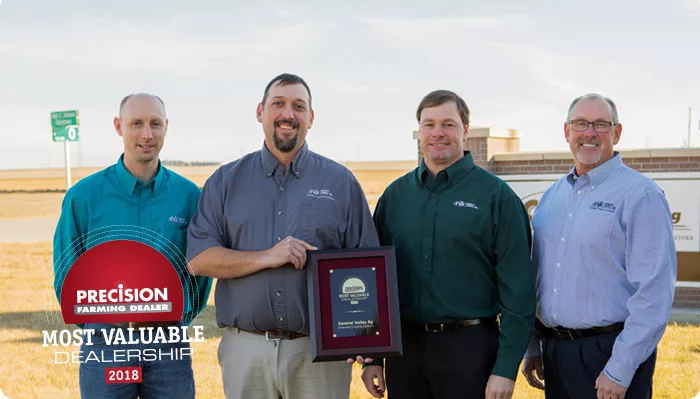Pictured Above: To maintain a competitive edge and satisfy customer demand for product and service diversity, Central Valley Ag, the 2018 Precision Farming Dealer Most Valuable Dealership measures successes — and failures — on an acre-by-acre basis. Pictured (l to r) are Chris Winkelbauer, Advanced Cropping Systems (ACS) equipment manager; Keith Byerly, ACS manager; Glen Franzluebbers, director of professional ag services and Karl Hensley, senior vice president of agronomy.
Collaboration is often preached within the precision farming business of a dealership, but not always practiced. Both internal teamwork among employees across departments and cultivation of external partnerships with farm customers combine to create a profitable, productive culture.
This is the adopted and executed approach for Central Valley Ag (CVA), a 11,500-member farm cooperative based in York, Neb. Officially formed in 2003, the ag retailer has roots dating back to 1915 and operates 96 locations in eastern Nebraska, western Iowa and Kansas.
The company’s motto of “Growing Agriculture Together,” is far more than just a marketing slogan and provides a meaningful daily reminder of why precision farming is a growing contributor to the co-op’s $1.1 billion in revenue for fiscal year 2017, with more than 25% coming from agronomy services ($272 million) and precision hardware and support ($5.6 million.)
“Over the last several years we’ve been averaging about 10% growth year-over-year with our precision and agronomy businesses,” says Glen Franzluebbers, director of professional ag services for CVA. “But it’s a collaborative effort within the entire operation. Everybody is focused down the same path and looking at the same products and services.”
Central Valley Ag
Founded: 1915, Central Valley Ag formed in 2003
Employees: 900. The retailer has 26 employees directly involved with precision farming service/sales and another 400 working in agronomy
Precision Lines: Ag Leader Technology, Precision Planting, 360 Yield Center, Surefire Ag, Dakota Micro, FieldWise, MyWayRTK, DigiFarm, Reichhardt, Headsight, Yetter, Intelligent Ag
Locations: 96 total (48 agronomy)
3 Year Precision Revenue Breakdown (Fiscal Year):
2015: $5,700,000
2016: $6,100,000
2017: $5,600,000
3 Year Agronomy Revenue Breakdown (Fiscal Year):
2015: $332,000,000
2016: $380,000,000
2017: $272,000,000
3 Year Active Precision Service Acres (Fiscal Year):
2015: 550,000
2016: 600,000
2017: 550,000
“Consistency is one of the things that’s been successful for us, rather than everybody offering something different and doing something different.”
Dealer Takeaways
- Service depth and collaboration can result in a streamlined delivery of hardware and agronomic offerings.
- Proving ROI with per acre services like variable-rate and soil mapping is key to customer retention.
- Moving toward mobile support and data services simplifies decision-making for even late adopters of precision technologies.
To maintain a competitive edge and satisfy customer demand for product and service diversity, the 2018 Precision Farming Dealer Most Valuable Dealership measures successes — and failures — on an acre-by-acre basis.
Structurally Sound
The co-op launched its precision farming department more than 20 years ago, pre-dating the formation of CVA, turning agronomy from an aspect of its business into its calling card. Though proportionately a small portion of the co-op’s overall revenue, it’s been the foundation for overall growth, especially on the service side.
Some 76% of CVA’s total precision revenue comes from service, which is a separate division within the company’s agronomy division. CVA has a precision specialist in each of its 8 regions who is responsible for the day-to-day precision ag services activities including data processing, prescription development, mapping and moisture probe management.
The division also has 3 equipment technicians who are strategically placed throughout CVA and responsible for precision equipment sales, installation and service. Then there are 7 crop consultants who are responsible for scouting, data collection via grid and soil sampling and supporting the equipment technicians with field testing equipment.
Rounding out the deep roster of precision talent are 3 research and development specialists who conduct on-farm research, equipment and planting field trials and data analysis.
“Right now, our precision ag market share with our customers is about 50%, so there’s a lot of room for growth…” — Glen Franzluebbers
“We operate under a central dispatch and have large facilities that operate 60-mile geographies, and then within those areas, we have regional sales managers and operations managers,” says Karl Hensley, senior vice president of agronomy. “We offer communication to each of those managers and then we take it out from there to the rest of the precision employee group. But our efficiencies are mainly gained in the way we operate, and having a central dispatch is very key to how we operate.”
Franzluebbers offers an example to illustrate the efficiency and performance of CVA’s collaborative model in delivery of its multi-hybrid planting and variable-rate seeding solutions.
“Our precision equipment team installs and sets up the systems. They make sure the equipment can do the multi-hybrid functions and work with the planting components,” he says. “This year, within our research and development group, we did some on-farm trials and additional field trials in our innovation plots on writing those multi-hybrid prescriptions. We’ve collected the yield data from those trials, which our precision specialists will use to write the actual multi-hybrid and variable-rate prescriptions.”
ROI Equals Retention
Overall, CVA has a 26-person team dedicated to precision farming operations, and Keith Byerly manages the Advanced Cropping Systems (ACS) business for CVA. He joined the company in 2001 and notes that the single most important aspect of precision retailing for the co-op to succeed today and in the future is proving ROI to customers.
“We realized early on that having the equipment part was really paramount to being able to deliver the prescriptive services,” he says. “If we had the relationship in the cab with the grower, and were controlling the flow of data there, to help manage that data, they were going to turn right back around and trust us to use the prescription services.
“That was really a hand-in-hand relationship that started back on day one with us being able to do both sides of the business to the fullest of our customers’ potential.”
The scope, depth and quality of precision services offered by CVA has paid off with minimal customer turnover and is the biggest indicator of customer satisfaction, according to Byerly.
“Our precision department has a 90%-plus customer retention rate over the last 20 years,” he says. “We approach everything from an agronomy-first standpoint and the goal is to come up with solutions that not only pay for themselves, but pay for us to talk about the next thing. Our goal is not to spend all our time on cold-calls finding new customers — it’s deepening the business relationships with the ones we already have.”
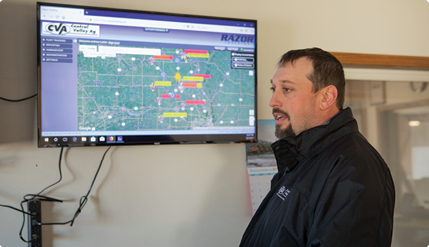
Central Valley Ag’s unique model for its 26-person precision farming team, includes a central dispatch and 48 agronomy locations that operate 60-mile geographies. Within those areas, there are regional sales managers and operations managers who are the primary contacts for sales agronomists and equipment specialists.
A key to keeping customers engaged and involved with their precision decision-making, is a simplified approach to service offerings. For the first 8 years, CVA’s precision priority was to get precision hardware onto customers’ farms, convinced that whoever sold the technology to a customer, would likely be the candidate to write the field prescriptions, which was the co-op’s ultimate goal.
As the retailer found success combining hardware sales and agronomic service, developing a dedicated staff with specialized knowledge included a move to fee-based model for billing out precision services. Equipment services are charged by the hour, while data management services are billed by the acre.
CVA offers a variety of precision services, including yield and field mapping, GPS and RTK signal subscriptions, soil sampling and equipment installations, with the majority of their precision revenue coming from data analysis.
For creating standard field zones, based off aerial imagery and soil type analysis, CVA charges $4.75 per acre. For its advanced zone package, which includes tying in electrical conductivity (EC) data and mapping, yield data, elevation data and aerial imagery, the co-op bills $6.75 per acre.
Customers have the option of bundling in variable-rate fertilizer or seeding for an additional $3 per acre, but the price is dependent on how long they’ve been utilizing the services.
“While we have this huge desire to offer [mandatory] service plans and better schedule some of our service calls, it’s also been one of our biggest sales tools that we don’t have those plans,” Byerly says. “We focus on improving ROI to the growers by keeping it simple. For example, we look at just the variable-rate nitrogen component separate from other things. Or we look at just variable-rate seeding or multi-hybrid planting as separate things.
Sponsored by

Check out the 2018 MVD Video Series Online!
Visit www.PrecisionFarmingDealer.com to watch exclusive interviews with members of Central Valley Ag’s precision team. Filmed at several of the dealership’s locations in Nebraska and in the field, these videos capture the innovative strategies and proven practices utilized by the 2018 Most Valuable Dealership and are being sponsored by 360 Yield Center.
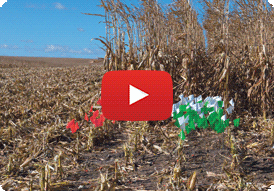
Topics Include:
- Prescribing & Pricing Precision Services for True ROI
- How Precision Services Translate to Customer Retention
- Targeting Precision Opportunities Through Collaboration & Consistency
- Structuring a Precision Business for Sustainable Growth
- Creating Customized Services that Deliver Flexibility & Proven Payback
- Capitalizing on Precision Niches with Product Diversity
“We let every piece stand for itself, and let the grower decide the value that they want to put to that ROI. We really try to not talk about ROI as a dollar and cents number. We talk about a ratio that we expect to see for what we’re doing out there.”
Based on its own test plot results and customer feedback, CVA sells its services with a 2 or 3-to-1 return on investment for farm customers, which has helped reach 550,000 active service acres in fiscal year 2017.
“We expect to grow our variable-rate seeding prescription acres by 25% per year for the next 3 years,” Byerly says. “The ability to utilize advanced zones and the interaction with our seed team will enhance our program and gain us increased access to customers and overall market exposure.”
Product Proficiency
While agronomy is considered the cornerstone of CVA’s precision business, hardware sales are the foundation. Chris Winkelbauer is the ACS equipment manager and oversees a 3-person team responsible for setup and installation of precision components.
Working with a dozen different suppliers, CVA’s three biggest are Ag Leader Technology, 360 Yield Center and Precision Planting. Maintaining open lines of communication with each one is critical to maintaining a high level of support for the products being sold.
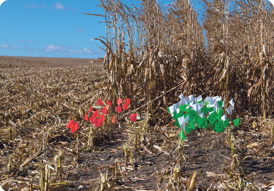
Based on its own test plot results and customer feedback, Central Valley Ag sells its service programs with a 2 or 3-to-1 return on investment for farm customers, which has helped reach 550,000 active service acres in fiscal year 2017.
Winkelbauer notes that the best suppliers represent the co-op’s biggest volume of sales, and not because their products are that much better, but because of their policies and service to the co-op.
“They have opened up communication and let us have more direct access to senior level execs and to the engineering side,” he says. “The companies that don’t do that are the ones we struggle to hold margins on and have dealers who price and sell their products below market value.”
One of the competitive challenges CVA works to overcome is convincing customers that precision hardware is only as valuable as the service behind it. Winkelbauer and his team charge an hourly rate for equipment installation, and follow-up to ensure all systems, whether it’s a guidance platform, hydraulic down force or auto-steering system, are functioning properly.
“The thing we run into a lot is there are some ‘overnight dealers’ that just want to move product and get it out there quick,” he says. “There’s not much support behind what they sell. That’s where we really strive to make sure we follow through and give that support afterward. There’s nothing worse than buying something and then feeling like you’re on an island.”
Specializing in Diversity
In the next 3-5 years, Byerly sees the precision industry and customers going in two separate directions, which will necessitate more specialization with products and services to maintain a competitive advantage.
What the Judges Say About Central Valley Ag…
“They have an extremely balanced and service-oriented approach to their precision ag business …”
“I like that they utilize field research and test plots to prove ROI to customers, rather than just pushing products out the door …”
“90% customer retention is an impressive number. I loved to see that …”
“The completeness of their precision business is impressive. It’s not just hardware or agronomy. They blend it together in an impressive manner …”
“The industry is trying to make easier buttons and solutions for all,” he says. “They are losing the personalized touch with individual dealers and growers, and think the brute strength of data will trump boots on the ground. Couple that with a large influx of young talent to the precision ag industry, and we will see some challenges in the country as growers have more choices, and have to vet out a few systems that are not right for their farms.”
To combat this, CVA is broadening its reach into areas including variable-rate irrigation, as more water regulations take hold in its service region. The company formed a nitrogen and water management group, made up of its most progressive customers, to be the beta testers of new products and services that come to market.
What Suppliers Say About Central Valley Ag…
Precision Farming Dealer interviewed Hope Lewis, Ag Leader Technology’s High Plains territory manager, and Travis Harrison, regional agronomy manager for 360 Yield Center, to get their personal and professional insights on the 2018 Most Valuable Dealership, Central Valley Ag (CVA).
Consistent Communication
Prior to joining Ag Leader in 2014, Lewis worked with Keith Byerly, CVA’s Advanced Cropping Systems (ACS) manager and Chris Winklelbauer, ACS equipment manager, as a precision ag specialist for Titan Machinery. Lewis works with CVA simplifying situations that aren’t necessarily “by the book,” including warranty processes. Touching base with Byerly and Winkelbauer several times per week, she acts as the primary point of contact for Ag Leader.
“We discuss sales reviews, marketing ideas, advertising activities, training needs and upcoming events,” Lewis says.
Harrison echoed a similar routine in his 2 years working for 360 Yield Center and consulting with CVA, noting regular discussions with Winklelbauer on improving nutrient efficiency.
“In a partnership with CVA this past growing season, we worked with nine farmers across five states, providing in-season crop management from start to finish and taking a diligent approach to understand what’s going on in each operation,” Harrison says. “On average, those growers saved 26 pounds of nitrogen (N) and increased yields by about 8 bushels per acre of corn.”
A Personalized Approach
CVA hosts an annual dealership summit every December, a 2-day event geared toward managers and salespeople across CVA’s 96 locations. The meetings and workshops include a focus on sales strategies for products sold throughout the dealerships, as well as hands-on seminars on product logistics and functionality. Products addressed range from 360 Yield Center’s latest sidedress bars to Ag Leader’s AgFiniti data-sharing cloud program.
“While CVA representatives will normally take charge of the sessions, we support them with the talking pints and products needed on site, including exhibits and hands-on displays,” Harrison says. “We then follow up with them to evaluate how the sessions went. It’s a great way to maintain dealership relationships and maintain a thorough education process.”
“We have a lot of farmers who soil sample and variable-rate their fields, but when we start looking at managing the data in such a way that we’re incorporating all of that into our irrigation, multi-hybrid and advanced seeding recommendations, that go deeper than soil types, that’s where we haven’t got past the early adopters yet,” Byerly says.
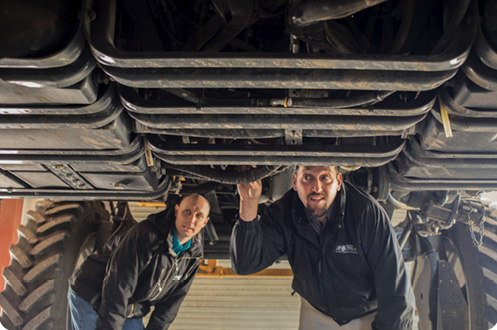
Chris Winkelbauer (l) and Keith Byerly like to let every aspect of precision hardware and service Central Valley Ag sells stand for itself, allowing customers to decide the value that they want to put to their return on investment. “We really try to not talk about ROI as a dollar and cents number,” Byerly says. “We talk about a ratio that we expect to see for what we’re doing out there.”
But CVA is also investing in more mobility with its services, developing its own seed app, which sales agronomists are utilizing in the field and also switching over its enterprise resource planning (ERP) software system to Merchant Ag.
“We’re looking at a fully integrated system, into our ground control, our central dispatch system and into our ERP system,” Hensley says. “Our field sales agronomists will work with a customer on the farm, start making those recommendations, and it will be implemented right there at the farm.”
“We expect to grow our variable-rate seeding prescription acres by 25% per year for the next 3 years…” — Keith Byerly
In 2017, CVA joined several other ag retailers in forming Field Reveal, an agronomic data platform. Through front end algorithms, the tool is designed to simplify the prescription-writing process for seed and fertilizer recommendations based on geo-referenced, multi-layered sampling taken from grids, soil management zones or a combination of both.
“The Field Reveal group has a very good relationship with the other equipment dealers out there, so we can take those prescriptions and send them to our customers’ machines, or to our own machines,” Franzluebbers says. “It’s going to be a scalable program and right now, our precision ag market share with our customers is about 50%, so there’s a lot of room for growth.
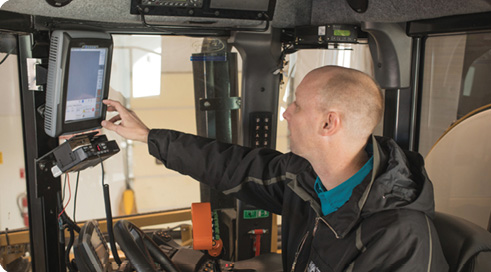
One of the competitive challenges Central Valley Ag works to overcome is convincing customers that precision hardware is only as valuable as the service behind it. Chris Winkelbauer and his team charge an hourly rate for equipment installation and follow-up to ensure all systems, whether it’s a guidance platform, hydraulic down force or auto-steering system, are functioning properly.
“If we can get that number to 90% or 100%, we have to have the wireless data transfer and a way to deliver those prescriptions to our customers in a fast, easy, efficient manner so we can ramp it up and scale this program up.”
Byerly points to a goal of 15% growth per year in precision farming products and services, with a strategy based on the implementation of FieldReveal and the co-op’s sales agronomists playing a more direct and interactive role with customers.
“I believe what we will see is that our team of precision ag specialists will have a narrower focus,” Byerly says. “We will begin to see people specialize on a concept or service offering more than a territory or customer group. This will give us an opportunity to let employees really focus on their area of passion, and have better services for our growers.”

